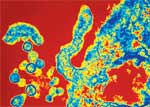 NEW HAMPSHIRE UniversityThe Viral Genetic Diversity Network (VGDN) is set up and working. Its initial configuration will include 18 laboratories, 10 located in the metropolitan region of São Paulo and 8 in towns in the country. These laboratories were selected from the 35 proposals presented to FAPESP that will finance the project that began last December with the edictal inviting interested institutions to participate in the initiative. “We were able to attract to the network research centers from the main regions of the state. Perhaps the only important region that was stayed out was Santos”, says Eduardo Massad, of the School of Medicine of USP, one of the coordinators of the VGDN.
NEW HAMPSHIRE UniversityThe Viral Genetic Diversity Network (VGDN) is set up and working. Its initial configuration will include 18 laboratories, 10 located in the metropolitan region of São Paulo and 8 in towns in the country. These laboratories were selected from the 35 proposals presented to FAPESP that will finance the project that began last December with the edictal inviting interested institutions to participate in the initiative. “We were able to attract to the network research centers from the main regions of the state. Perhaps the only important region that was stayed out was Santos”, says Eduardo Massad, of the School of Medicine of USP, one of the coordinators of the VGDN.
The laboratories are going to take up the task of sequencing the DNA of samples of the four viruses present in the state: HIV-1, the main cause of Aids; HCV, the transmitting agent for hepatitis C; Hantavirus, responsible for a mysterious and rare syndrome of the lungs; and the respiratory syncytial virus VRS, which provokes infections in the respiratory tract, mainly in children. The investment in the setting up the network is US$ 8 million, to be spent over a three- year period.
A policy of prevention
What is the significance of this work? Without the mapping of the genetic code of a significant quantity of the viruses that circulate and infect the population of a determined location, it is impossible to establish the dominant variations of the pathological agents in this location. To understand the most common types of the viruses present in the state will allow the planning of a better epidemiological policy of prevention and treatment of illnesses, as well as the generation of important knowledge for scientific research. Enabling the laboratories of various towns of São Paulo to cope with the viruses, the VGDN is also following the objective of providing the state with a group of laboratories which, in the future, may be used permanently and ordinarily by the Health Department of the State.
Three levels
According to the degree of competence and the conditions of security in the handling of the virus demonstrated at the time of registration, the 18 laboratories were divided into three levels. At level 1, L1, the most basic, 12 institutions were selected, which initially are suitable for work only with the viruses HIV-1 and HCV. At level 2, L2, five laboratories were grouped together. And these are able to deal with these two pathological agents as well as the VRS.
Only one center reached the most advanced stage of the project, level 3, L3, being therefore, capable of carrying out laboratory analysis with all four viruses. “As we expected, the network is beginning with a heterogeneous grouping. Our goal is to go on, step by step, improving the performance of the units that are at the bottom of the VGDN. In 2002, we would like all of the laboratories to have reached level 2”, says Dr. Eduardo Massad.
THE LABORATORIES OF THE VGDN
Level L1
Alberto José da Silva Duarte – Medical School of USP
David Jamal Hadad – State Health Department
Édimo Garcia de Lima – Medical School of São José do Rio Preto
Fábio Caldas de Mesquita – Municipal Health Department of São Paulo
Fernando Lopes Gonçales Junior – School of Medical Sciences of Unicamp
Flair José Carrilho – Medical School of USP
José Fernando Garcia – Veterinary Medicine of Unesp/Araçatuba
José Luiz Caldas Wolff – University of Mogi das Cruzes
Leonardo José Richtzenhain – School of Veterinary Medicine and Zoo Technology of USP
Maria Ines de Moura Campos Pardini -Medical Faculty of Unesp/Botucatu
Osvaldo Augusto Brazil Esteves Sant’AnnaButantan Institute
Sang Won Han – Unifesp
Level L 2
Cláudio Sérgio Pannuti – Medical School of USP
Eurico de Arruda Neto – Medical School of Ribeirão Preto of USP
João Manuel Grisi Candeias – Institute of Biosciences of Unesp/Botucatu
Mirthes Ueda – Adolfo Lutz Institute
Paula Rahal/Eloiza Helena Tajara da Silva – Institute of Biosciences, Letters, and Exact Sciences of Unesp/São José do Rio Preto
Level L3
Benedito Antônio Lopes da Fonseca/Luiz Tadeu Moraes Figueiredo – Medical School of Ribeirão Preto of USP